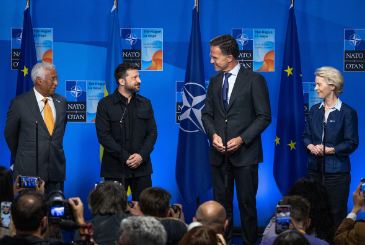The NATO summit in The Hague comes at a critical juncture, with the alliance facing its most significant challenges since the Cold War. The war in Ukraine remains the most pressing issue, and while NATO has stood firm in its support for Kyiv, the question remains: Can this summit provide a real solution, or will it merely reinforce existing divisions?
Nearly two and a half years into Russia’s invasion, Ukraine remains locked in a brutal war of attrition. Despite Western military aid, Kyiv’s counteroffensive has not delivered a decisive victory, and Moscow shows no signs of backing down. The NATO summit is expected to discuss long-term security guarantees for Ukraine, but will it go beyond rhetoric and propose a viable path to peace?
U.S. President Donald Trump, attending the summit, claimed credit for brokering the recent Israel-Iran ceasefire and suggested that a similar deal could be possible between Russia and Ukraine. However, the two conflicts are vastly different. While Israel and Iran had no territorial disputes, Russia is deeply entrenched in occupied Ukrainian land. Would Putin accept a truce without major concessions? Would Ukraine agree to any deal that compromises its sovereignty?
Trump’s assertion that he helped mediate the Israel-Iran truce has raised eyebrows, especially since both sides downplayed U.S. involvement. Still, his presence at the NATO summit adds an unpredictable element. Known for his unconventional diplomacy, Trump has previously claimed he could end the Ukraine war “in 24 hours.” If he re-enters the White House, will he push for a negotiated settlement—even if it means pressuring Ukraine to cede territory?
Some European leaders fear such an approach could reward Russian aggression. Yet, with Western support for Ukraine wavering and U.S. elections looming, NATO must consider all possible avenues—including backchannel diplomacy—to prevent a prolonged and unwinnable war.
The summit also highlights tensions within NATO itself. While Eastern European nations demand stronger commitments to Ukraine, others, like Hungary and Slovakia, oppose further escalation. The alliance must balance military support for Kyiv with the risk of direct confrontation with Russia.
A lasting solution will require more than just weapons—it needs a coherent diplomatic strategy. If NATO can leverage its collective strength to push for credible negotiations, this summit could mark a turning point. If not, the war will drag on, with devastating consequences for Ukraine and global security.
The Hague summit is a test of whether NATO can adapt to today’s geopolitical realities. The alliance must decide whether it is merely a military bulwark or a force for conflict resolution. While a breakthrough on Ukraine seems unlikely now, the groundwork for future talks must begin here. Otherwise, the world may face years more of war—with no end in sight.

















